新概念英语(青少版)2A Written test课件 (共36张PPT)
文档属性
| 名称 | 新概念英语(青少版)2A Written test课件 (共36张PPT) |
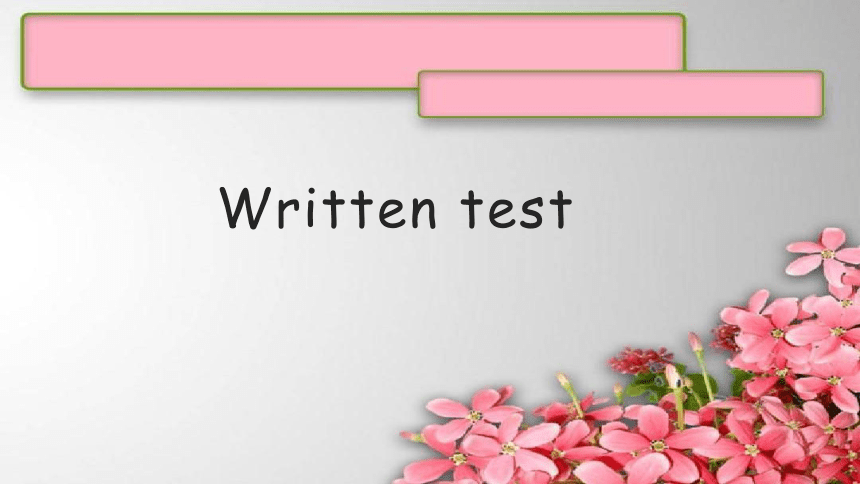
|
|
| 格式 | pptx | ||
| 文件大小 | 183.2KB | ||
| 资源类型 | 教案 | ||
| 版本资源 | 新概念英语 | ||
| 科目 | 英语 | ||
| 更新时间 | 2024-04-19 00:00:00 | ||
图片预览

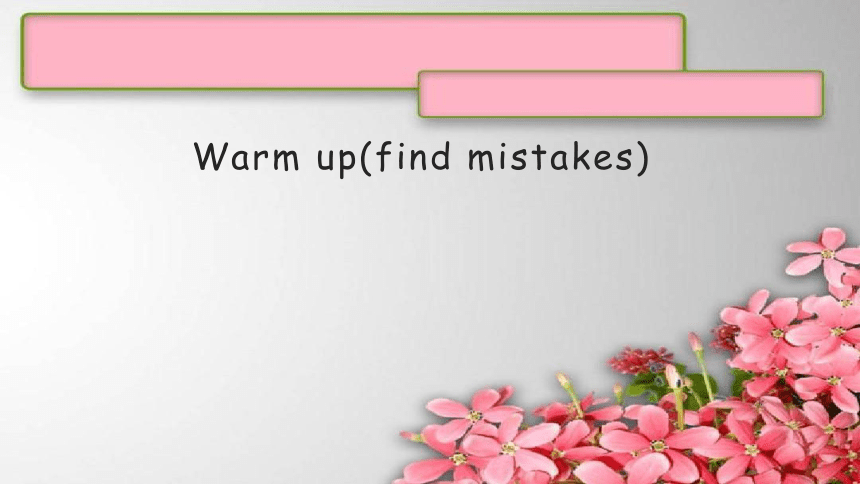

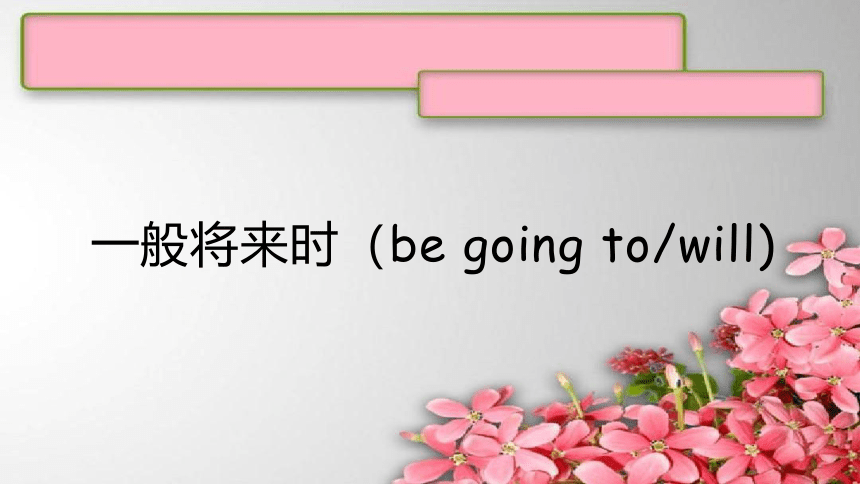
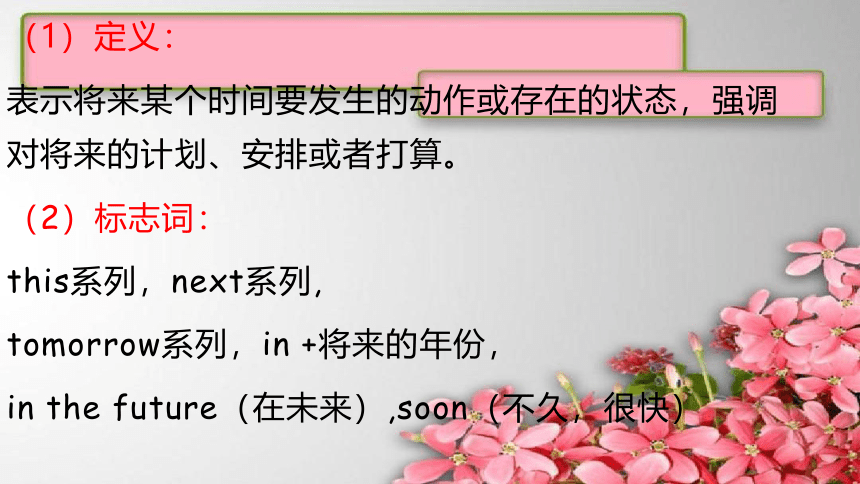

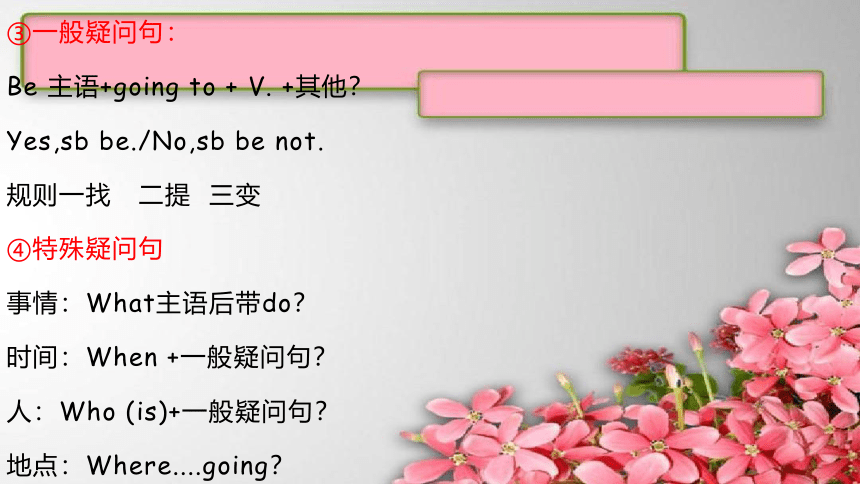

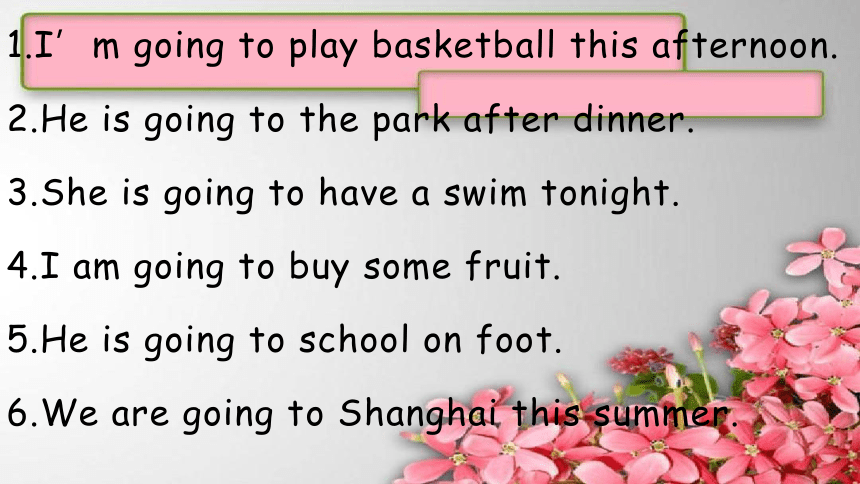


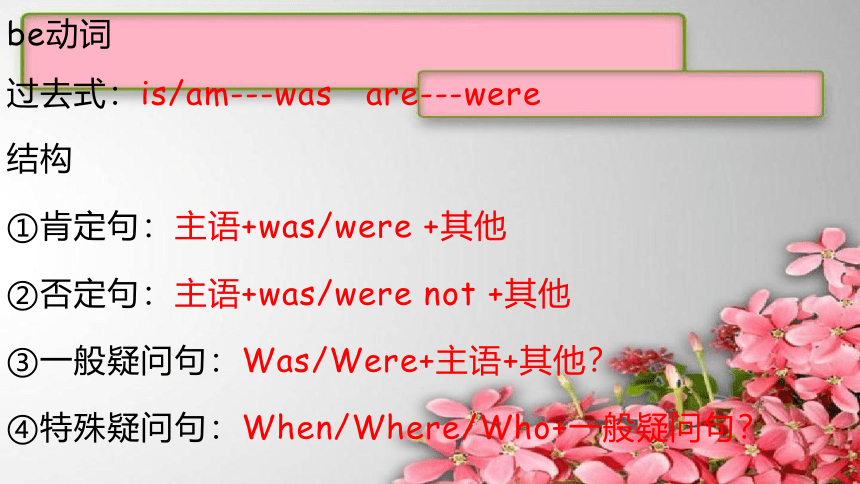
文档简介
(共36张PPT)
Written test
Warm up(find mistakes)
1.She go to the park last night.
2.They want us read books.
3.He have a good trip yesterday.
4.How much books do you have
5.What are she doing at the moment
一般将来时(be going to/will)
(1)定义:
表示将来某个时间要发生的动作或存在的状态,强调对将来的计划、安排或者打算。
(2)标志词:
this系列,next系列,
tomorrow系列,in +将来的年份,
in the future(在未来),soon(不久,很快)
(3)结构
①肯定句:
主语+ be going to + V. +其他
注:be going to go to+地点=be going to+地点
②否定句:
主语+ be not going to + V. +其他
规则:一 找 二 加 三 变
③一般疑问句:
Be 主语+going to + V. +其他?
Yes,sb be./No,sb be not.
规则一找 二提 三变
④特殊疑问句
事情:What主语后带do?
时间:When +一般疑问句?
人:Who (is)+一般疑问句?
地点:Where....going?
结构:
肯定:主语+will+V+其他.
e.g: She will see a movie tomorrow.
否定:主语+will not(won’t)+V+其他.
e.g: She won’t see a movie tomorrow.
一般疑问:Will+主语+V+其他?
Yes,sb will./No,sb won’t.
e.g:Will she see a movie tomorrow?
Yes, she will./No,she won’t.
1.I’m going to play basketball this afternoon.
2.He is going to the park after dinner.
3.She is going to have a swim tonight.
4.I am going to buy some fruit.
5.He is going to school on foot.
6.We are going to Shanghai this summer.
一般过去时(be动词、实义动词)
1.定义:
表示过去某个时间里发生的动作或状态。
2.标志词
yesterday系列:yesterday morning
last 系列:last month
in+ 过去年份系列:in 2000
一段时间+ago系列 :an hour ago
just now(刚才)
this系列等
be动词
过去式:is/am---was are---were
结构
①肯定句:主语+was/were +其他
②否定句:主语+was/were not +其他
③一般疑问句:Was/Were+主语+其他?
④特殊疑问句:When/Where/Who+一般疑问句?
1.I ______ at the supermarket yesterday.
2.The girl ______happy last night.
3.Where ____ she yesterday afternoon
4.We____at school last Monday.
5.My father _____ ill last month.
6.___ he hungry last week?
7.They ___in China last week.
8.It ___ a cute dog last year.
1.My father was ill yesterday.
2.My parents were at home last week.
3.The twins were in Dalian last year.
4.Your father was at work the day before yesterday.
5.Linda was at home last Friday.
①肯定:
主语+动词过去式+其他
②否定:
主语+ didn't +动词原形+其他
(规则:一找实义动词,二过去式还原,三加didn’t)
③一般疑问:
Did +主语+动词原形+其他
(规则:一加Did,二过去式还原,三变)
④特殊疑问:
What/When/Where/Who+一般疑问?
实义动词
动词过去式变化规则——直去变双
①一般情况下,动词词尾加 ed ,
②以不发音的 e 结尾动词,动词词尾加 d,
③以辅音字母 + y结尾的动词,把y变为i 再ed,:
④以一个辅音字母结尾的重读闭音节动词,双写词尾辅音字母,再加 ed,
一.动词过去式
go_______ try______
do_______ play______
work______ stop_______
study______ have_______
bake______ arrive_______
1.I played football yesterday.
2.She visited the museum last month.
3.They went to the park this morning.
4.My father studied English 2 years ago.
5.Linda did homework last night.
6.I had a good breakfast yesterday morning.
7.Karen had a good time last week.
8.They played games last night.
9.She painted pictures just now.
10.He baked cookies an hour ago.
11.I visited this musuem the day before yesterday.
12.They washed the car in the park yesterday.
一般现在时(实义动词)
1.定义:
(a):表示经常反复发生的动作或存在的状态
(b):表示普遍真理,事实,也用在格言中
2.标志词
(1)频度副词:sometimes, usually, often, always, never
(2)at + 时间点
(3)every morning/afternoon/evening/day
(4)once a week等
3.结构
a.非第三人称单数:
主语+实义动词+其他.
b.第三人称单数:
主语+实义动词三单形式+其他.
4.句型转换
a.否定句
主语 + don't/doesn't+实义动词原形+其他.
规律:一找,实义动词 二加,don't,doesn't 三还原,实义动词还原
b.一般疑问句
Do/Does + 主语 +实义动词+其他?
Yes,sb do/does. No,sb don't/doesn't.
规律:一加,句首加do、does 二变,人称,some变any,符号
三还原,实义动词还原
5.实义动词三单变化规则
(1)一般情况下 + s ,work-works
(2)以s、x、sh、ch、o结尾 + es ,
go-goes、 teach-teaches
(3)辅音字母+结尾的变y为i + es,study-studies(4)特殊:have—has
1.We wash face every day.
2.I often go to school at 7:30.
3.Jack likes eating apples.
4.We often fly a kite in the park.
5.He sometimes reads books in the library.
6.He likes playing basketball.
现在进行时
1.定义 :
表示现在某一时刻或某一阶段正在进行的动作。
2.标志词:
now,listen,look,these days,at the moment,It's+时间
3.结构:
①肯定
主语+be+V-ing(动词现在分词)+其它
②否定
主语+be not+V-ing+其它
③一般疑问及回答
Be+主语+V-ing+其它?
4. 动词现在分词变化规则(直去双特)
a. 一般情况下,动词末尾直接加ing go-going
b.以哑e结尾,去e加ing make-making
c.重读闭音节的单词(辅元辅),应双写末尾的辅音字母,再加ing . stop-stopping
d.以ie结尾,先将ie变y,再加ing lie-lying
1.She ___ (do) homework now.
2.Her father ___ (read) a book at the moment.
3.They ___ (play) footbal at school now.
4.We ___ (eat) lunch now.
5.He ___ (drink) coffee at the moment.
6.She ___(dance) at home now.
二.用词的适当形式填空
1.She___(go) to the park tomorrow.
2.They___(be) teachers three years ago.
3.We___(play) basketball just now.
4.She___(cook) dinner at home tomorrow .
5.I want___(ride) a bike in the park.
6.She wants me__(see) a movie.
7.My teacher __(leave) home next week.
8.There__(be)some water in the fridge just now.
9.We__(visit) the Great Wall last year.
10.He__(clean) his bedroom tomorrow.
三.句型转换
1. They want to ride a bike.(成否定句)
2.There were some apples on the table.(一般疑问句)
3. He played games yesterday.(一般疑问句)
4. She goes to school on foot.(一般疑问句)
5. Peter arrived home last night.
6.They visited the museum yesterday.(一般疑问句)
7.They will have a swim.(否定句)
8.He often has a bath on Monday.(划线提问)
9.He did homework just now.(否定句)
10.I washed my cat last week.
Thank you
Written test
Warm up(find mistakes)
1.She go to the park last night.
2.They want us read books.
3.He have a good trip yesterday.
4.How much books do you have
5.What are she doing at the moment
一般将来时(be going to/will)
(1)定义:
表示将来某个时间要发生的动作或存在的状态,强调对将来的计划、安排或者打算。
(2)标志词:
this系列,next系列,
tomorrow系列,in +将来的年份,
in the future(在未来),soon(不久,很快)
(3)结构
①肯定句:
主语+ be going to + V. +其他
注:be going to go to+地点=be going to+地点
②否定句:
主语+ be not going to + V. +其他
规则:一 找 二 加 三 变
③一般疑问句:
Be 主语+going to + V. +其他?
Yes,sb be./No,sb be not.
规则一找 二提 三变
④特殊疑问句
事情:What主语后带do?
时间:When +一般疑问句?
人:Who (is)+一般疑问句?
地点:Where....going?
结构:
肯定:主语+will+V+其他.
e.g: She will see a movie tomorrow.
否定:主语+will not(won’t)+V+其他.
e.g: She won’t see a movie tomorrow.
一般疑问:Will+主语+V+其他?
Yes,sb will./No,sb won’t.
e.g:Will she see a movie tomorrow?
Yes, she will./No,she won’t.
1.I’m going to play basketball this afternoon.
2.He is going to the park after dinner.
3.She is going to have a swim tonight.
4.I am going to buy some fruit.
5.He is going to school on foot.
6.We are going to Shanghai this summer.
一般过去时(be动词、实义动词)
1.定义:
表示过去某个时间里发生的动作或状态。
2.标志词
yesterday系列:yesterday morning
last 系列:last month
in+ 过去年份系列:in 2000
一段时间+ago系列 :an hour ago
just now(刚才)
this系列等
be动词
过去式:is/am---was are---were
结构
①肯定句:主语+was/were +其他
②否定句:主语+was/were not +其他
③一般疑问句:Was/Were+主语+其他?
④特殊疑问句:When/Where/Who+一般疑问句?
1.I ______ at the supermarket yesterday.
2.The girl ______happy last night.
3.Where ____ she yesterday afternoon
4.We____at school last Monday.
5.My father _____ ill last month.
6.___ he hungry last week?
7.They ___in China last week.
8.It ___ a cute dog last year.
1.My father was ill yesterday.
2.My parents were at home last week.
3.The twins were in Dalian last year.
4.Your father was at work the day before yesterday.
5.Linda was at home last Friday.
①肯定:
主语+动词过去式+其他
②否定:
主语+ didn't +动词原形+其他
(规则:一找实义动词,二过去式还原,三加didn’t)
③一般疑问:
Did +主语+动词原形+其他
(规则:一加Did,二过去式还原,三变)
④特殊疑问:
What/When/Where/Who+一般疑问?
实义动词
动词过去式变化规则——直去变双
①一般情况下,动词词尾加 ed ,
②以不发音的 e 结尾动词,动词词尾加 d,
③以辅音字母 + y结尾的动词,把y变为i 再ed,:
④以一个辅音字母结尾的重读闭音节动词,双写词尾辅音字母,再加 ed,
一.动词过去式
go_______ try______
do_______ play______
work______ stop_______
study______ have_______
bake______ arrive_______
1.I played football yesterday.
2.She visited the museum last month.
3.They went to the park this morning.
4.My father studied English 2 years ago.
5.Linda did homework last night.
6.I had a good breakfast yesterday morning.
7.Karen had a good time last week.
8.They played games last night.
9.She painted pictures just now.
10.He baked cookies an hour ago.
11.I visited this musuem the day before yesterday.
12.They washed the car in the park yesterday.
一般现在时(实义动词)
1.定义:
(a):表示经常反复发生的动作或存在的状态
(b):表示普遍真理,事实,也用在格言中
2.标志词
(1)频度副词:sometimes, usually, often, always, never
(2)at + 时间点
(3)every morning/afternoon/evening/day
(4)once a week等
3.结构
a.非第三人称单数:
主语+实义动词+其他.
b.第三人称单数:
主语+实义动词三单形式+其他.
4.句型转换
a.否定句
主语 + don't/doesn't+实义动词原形+其他.
规律:一找,实义动词 二加,don't,doesn't 三还原,实义动词还原
b.一般疑问句
Do/Does + 主语 +实义动词+其他?
Yes,sb do/does. No,sb don't/doesn't.
规律:一加,句首加do、does 二变,人称,some变any,符号
三还原,实义动词还原
5.实义动词三单变化规则
(1)一般情况下 + s ,work-works
(2)以s、x、sh、ch、o结尾 + es ,
go-goes、 teach-teaches
(3)辅音字母+结尾的变y为i + es,study-studies(4)特殊:have—has
1.We wash face every day.
2.I often go to school at 7:30.
3.Jack likes eating apples.
4.We often fly a kite in the park.
5.He sometimes reads books in the library.
6.He likes playing basketball.
现在进行时
1.定义 :
表示现在某一时刻或某一阶段正在进行的动作。
2.标志词:
now,listen,look,these days,at the moment,It's+时间
3.结构:
①肯定
主语+be+V-ing(动词现在分词)+其它
②否定
主语+be not+V-ing+其它
③一般疑问及回答
Be+主语+V-ing+其它?
4. 动词现在分词变化规则(直去双特)
a. 一般情况下,动词末尾直接加ing go-going
b.以哑e结尾,去e加ing make-making
c.重读闭音节的单词(辅元辅),应双写末尾的辅音字母,再加ing . stop-stopping
d.以ie结尾,先将ie变y,再加ing lie-lying
1.She ___ (do) homework now.
2.Her father ___ (read) a book at the moment.
3.They ___ (play) footbal at school now.
4.We ___ (eat) lunch now.
5.He ___ (drink) coffee at the moment.
6.She ___(dance) at home now.
二.用词的适当形式填空
1.She___(go) to the park tomorrow.
2.They___(be) teachers three years ago.
3.We___(play) basketball just now.
4.She___(cook) dinner at home tomorrow .
5.I want___(ride) a bike in the park.
6.She wants me__(see) a movie.
7.My teacher __(leave) home next week.
8.There__(be)some water in the fridge just now.
9.We__(visit) the Great Wall last year.
10.He__(clean) his bedroom tomorrow.
三.句型转换
1. They want to ride a bike.(成否定句)
2.There were some apples on the table.(一般疑问句)
3. He played games yesterday.(一般疑问句)
4. She goes to school on foot.(一般疑问句)
5. Peter arrived home last night.
6.They visited the museum yesterday.(一般疑问句)
7.They will have a swim.(否定句)
8.He often has a bath on Monday.(划线提问)
9.He did homework just now.(否定句)
10.I washed my cat last week.
Thank you
同课章节目录
- Unit 1 Linda comes to London
- Unit 2 Good luck on Sunday
- Unit 3 Is this yours?
- Unit 4 The top three percent
- Unit 5 All about ants!
- Unit 6 An elegant size
- Unit 7 A good example
- Unit 8 A nice quiet afternoon
- Unit 9 Do Your own thing
- Unit 10 Tomorrow's another day!
- Unit 11 We all have our troubles
- Unit 12 The London bus
- Unit 13 The kalenjin
- Unit 14 Chocolate haven!
- Unit 15 It's a mystery to me!
